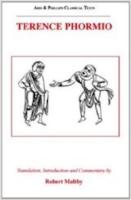
Aris & Phillips (2012) p/b 224pp £19.99 (ISBN 9780856686078)
Terence’s Phormio was adapted from a play (Epidikazomenos) by Apollodorus of Carystus, of whom little is known; the Phormio of the title is a ‘parasite’—better, ‘scrounger’ or ‘hanger-on’—to whom, rather as in Plautus, a good-sized role is allotted. M.’s admirably full introduction (26 pages) covers Greek New Comedy, Terence’s Roman Predecessors in Comedy, Terence’s Life and Works, the Cultural climate in Terence’s Time, Terence’s Prologues (in which he defends his theatrical practices), Theatrical Conditions in Terence’s Time, the Plot and Characters of Phormio and its Greek Original, Metre and Musical Accompaniment (where I would like to have seen a little more about the Lex brevis brevians), and Terence’s Text (brief, as is nowadays the custom). There is happily nothing on ‘Reception’. There follows the text, with a brief apparatus criticus, translation, and detailed commentary, in which the action is broken up into Acts and Scenes, as of course was not the Roman practice; en route, summaries of the plot are given.
Any student faced with Phormio should buy this book, for it is hard to think of any need which it will not fulfil or question which it will not answer. This is one of the very best commentaries—of course, deliberately cast at a level that is not so advanced as a ‘Green and Yellow’—that has come my way in recent times: would that I had had access to such a commentary as an undergraduate! M. is to be congratulated on a thoroughly satisfactory outcome to his labours, which, he tells us, occupied a long time. The wait was more than worthwhile, and the modest price is a bonus.
Colin Leach
